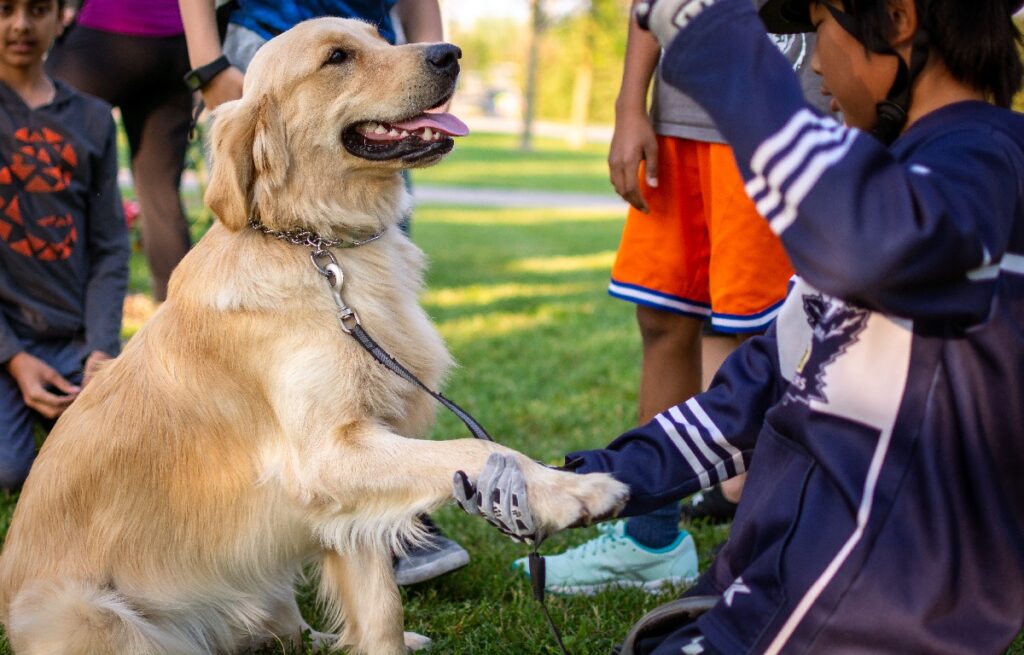Golden Retrievers and Labrador Retrievers, consistently topping popularity charts, often leave prospective owners in a delightful dilemma. Both breeds boast intelligence, loyalty, and playful personalities. But beneath their sunny dispositions lie subtle yet significant differences. From their luxurious coats and feathered tails to their retrieving styles and exercise needs, understanding these nuances is crucial for finding the perfect four-legged companion. This exploration dives into the key distinctions between Goldens and Labs, helping you choose the breed best suited to your lifestyle and enriching your life for years to come.
Do you like sports? Then this may be the greatest competition you’ve ever seen – the golden retriever vs labrador! I’ll admit, I used to get these two confused all the time. But when I learned about their differences, I finally figured it out.
Retrievers are athletic. They’re dependable and affectionate. They have been the constant companion for hunters and homes worldwide, and for good reason.
These two breeds take instruction like champs, and their endurance is admirable. It doesn’t hurt that they’re absolutely gorgeous!
You’re going to learn where these breeds came from and what their natures are like. And if you get really lucky, you just might end up with a golden retriever or Labrador in your own home.
Facts and History of Retriever Breeds
If you see a human hunter, you could see a happy, obedient, hard-working retriever dog right beside him/her. And if you talk about a specific retriever breed, the good-natured golden retriever, you might hear the name Dudley Marjoribanks (Lord Tweedmouth). He’s the guy who developed them in Scotland during Victoria’s reign.
For 50 years (1840–1890), he kept meticulous records of the dogs he was breeding in order to develop a retriever who would be able to successfully navigate the rugged terrain and inclement weather of the area.
He crossed his “Yellow retriever” with the currently extinct Tweed water spaniel and some other breeds, eventually landing on the golden retriever. It was in the early 1900s that the breed came to America.
Now, let’s put the Labrador in the spotlight… This phenomenal hunting gun dog (the most popular in the world) came from Newfoundland in Canada. When English nobles visited there, they returned to their homeland with “Labrador dogs” during the late 19th century.
They refined and standardized the breed. The Lab was a duck retriever and a fisherman’s mate and possessed every quality either would need.
The Kennel Club (UK) recognized the breed in 1903, and the American Kennel Club (AKC) did the same in 1917.
Labradors remained at the American Kennel Club’s number-one spot for Most Popular Dog Breeds for 31 years. (Note: In 2022, the Labrador took the number two spot behind the French bulldog.)
Difference Between Labrador Retrievers and Golden Retrievers
Here’s an easy-to-understand breakdown of the Golden Retrievers and Labrador Retrievers debate.
Golden Retriever vs Labrador
Appearance
Labrador – These family dogs have a sleek appearance with sturdy bodies and a broad chest. The Lab’s thick tail, called an “otter tail,” helps them maneuver while swimming. They can have brown or hazel eyes.
Golden – Their hair hangs long on their bellies, tails, legs, and ears, unlike the sleek look of the Lab. A golden’s eyes may appear to be smaller than a Lab’s, which is probably due to having more hair around that area.
Coat
Labrador – Canada has freezing water temperatures, and Labs were bred with double coats to withstand icy waters. They come in the colors black, chocolate, or yellow lab and have dense, “hard” (not silky or wiry) undercoats and short outer coats that cover their muscular bodies.
Golden – They’re also double-coated but have medium-length hair. They come in dark golden, golden, or light golden coat colors. Like the Lab, they’re solidly built.
Life span
Labrador – 11-13 yrs.
Golden – 10-12 yrs.
Weight
Labrador – 55-80 lbs.
Golden – 55-75 lbs.
Health issues
Labrador
- Ear infections
- Heart issues
- Elbow dysplasia
- Hip dysplasia
- Centronuclear Myopathy (CNM) – Muscular
- Cancer
- Eye disease
Golden
- OCD – Inflammation of the bone (cartilage)
- Elbow dysplasia
- Hip dysplasia
- Cancer
- Skin conditions
- Eye conditions
- Heart issues
Personalities
Labrador – Friendly, outgoing, and loving. Labs are famously popular for their easy natures. They’re nonaggressive and gentle and never meet a stranger since they’ll welcome everyone as a friend.
Golden – Full of joy and playfulness, the golden will remind you that every moment in life is a gift to be lived. Completely devoted to their guardian, you’ll never need to question your importance in their lives.
Sociable and trainable
Labrador – Labs are called “excitable,” which doesn’t sound so good, but it just means they’re passionate about everything, including meeting people and other animals. Labs are so smart they may get ahead of you while in training. Keep sessions short, and don’t underestimate them. They could probably train us if we’d let them.
Tip: Figure out what motivates your Lab – Food? Toys? Praise? When you’re training, use the one they love best.
Golden – Goldens are wonderful with seniors, kids, strangers, and other animals. They interact with plenty of tail wags and smiles — They’re friendly dogs. When it’s time to be trained, they will patiently wait as their guardian gives them the next command. They’re eager to please and want to succeed when they receive your instructions.
Tip: Don’t forget to find out what motivates them the most.
Cost
Labrador – A Lab from a breeder can cost anywhere from $500-$1,500, depending on the type of dog you’re looking for (working or showing/competitions), the location/state of the breeder, and the lineage of the dog. The best idea is to adopt one from your local shelter/rescue or breed-specific rescue for $50-$500.
Golden – A golden from a breeder can cost anywhere from $1,000-$4,000, depending on the type of dog you’re looking for (working or showing/competitions), the location/state of the breeder, and the lineage of the dog. The best idea is to adopt one from your local shelter/rescue or breed-specific rescue for $200-$500.
Labrador and Golden Retriever Similarities
Golden Retriever vs Labrador
- Double coats – This means there’s a harsh topcoat and a soft undercoat used for insulation.
- High shedders – I have two close friends who happen to be a golden and a Lab. The shedding is profuse. Twice a year, they “blow” (shed) their coats, and the rest of the year, you may find chunks of hair everywhere. Is it worth having one as a companion? Absolutely, positively, yes!
- Low maintenance – Grooming
As much as these two breeds shed, you’d think grooming would be constant, but as long as you brush them regularly between baths, they will stay radiant and beautiful. Don’t forget nail trims every couple of months and regular teeth brushing.
Sporting Group
Both sporting dogs are members of the Sporting group.
Size
Golden retriever – 21.5”-24” tall; Labrador retriever – 21.5”-24.5” tall
Golden – 55-75 lbs; Lab – 55-80 lbs.
Good With Young Children, Seniors, Strangers, and Other Dogs
Labrador retrievers share extremely similar temperaments with goldens. They can get along with anyone. They are used as guide dogs too.
Devoted, Affectionate, and Friendly
These dogs can’t imagine being without their guardians. They want to equally be by the side of the hunter and the non-hunter.
- Easy to train
- Not suited to be watchdogs. They’d welcome a stranger in with open paws.
- Highly intelligent – Can you imagine being trained to fetch waterfowl or birds on land and retrieving them to the hunter unharmed (these breeds have “soft mouths”)? That takes a lot of smarts, and both of these dogs have it.
- High energy – To make sure you have a happy and healthy dog, do things with them they excel at.
Golden excels at:
- Hunting trips
- “Tandem” bike rides
- Long runs
- Hikes
- Field trials
- Obedience training/competitions
- Agility
- Tracking
Labradors tend to excel at:
- Field trials
- Hunting trips
- Obedience competitions
- Agility
- Tracking
- Dock diving
- Search and rescue
- Drug and bomb detection
- Assistance/ Service dogs
Common Misconceptions
Keep in mind:
- These two family dog breeds were originally bred to be retrievers. That means it’s ingrained, innate in them to retrieve things. So, if you don’t want your undies paraded in front of the company, don’t leave them out to be retrieved.
- There is no such animal as a golden Lab. That was probably created by joining the names of the two breeds.
- Both breeds shed profusely. Get accustomed to having hair as an accessory.
- Both breeds can become agitated and destructive. If a golden or a Lab isn’t properly socialized, trained from a young age, or flat-out neglected, they can develop undesirable behaviors that can even include aggression.
Which Breed Is Better for You: Golden Retriever vs Labrador?
Since these two breeds are so similar in temperament and behavior, first decide which color you’d like (Black, chocolate, yellow? Or golden?) and choose accordingly.
Dog owners report that goldens are generally more careful and a bit more apprehensive than Labs. Hypothetically, if you ask a golden retriever over for a barbecue, they’ll RSVP and ask if there are adequate fire prevention practices in place. A Lab will bound in with friends and a cake lit with candles.
You may want a Lab if you don’t want cascading drifts of hair everywhere since they shed a little more discreetly. Neither breed, though, is considered to be hypoallergenic.
You’re looking at two medium to large breeds that are highly active and intensely affectionate so consider your lifestyle and personal tastes to choose your new family member.
FAQs
Which Is the Good Choice, a Golden Retriever or a Labrador Retriever?
There’s no bad choice when you’re choosing from two of the most popular breeds on the planet. Both golden retrievers and Labs are similar in temperament and training capabilities, among other things, so you might just need to decide what color of breed you’d prefer to have – Labrador (black, chocolate, or yellow) or golden (golden, dark golden, light golden).
Who Is Smarter, the Labrador or the Golden Retriever?
There’s no way to truly measure or compare the intelligence of two super-intelligent dog breeds. They both regularly rank as two of the most intelligent.
Having said that, According to The Intelligence of Dogs, which ranks 131 dog breeds in terms of their intelligence, the golden retriever is number four on the list and the Lab is number seven.
What Are the Pros and Cons of Labradors vs Golden Retrievers?
PROS – Both breeds:
- Highly affectionate
- Easily trained
- Eager to please
- Devoted to guardian
- Adaptable (As long as they’re properly exercised, they can live in a city apartment or on a farm.)
CONS – Both breeds:
- High shedders
- High shedders
- High shedders
Really, though, there are not a lot of negative things to say about a golden or a Lab. Except you might need to spend more money on paper towels due to their frequent kisses.
Are Golden Retrievers or Labradors Easier To Train?
A golden may be a bit more patient than a Labrador retriever while in training, but both Labs and Goldens are easy to train.
Wrap-up
I believe if these two breeds didn’t have “retriever” in their name, many people could differentiate them more easily. Of course, then, it would take away their identity. Anyway, now that we’ve shared some differences and similarities these two breeds have, you should be a pro at identifying each.
Every dog guardian thinks they’ve chosen the best dog (which is true if their dog is happy), and we think a Lab OR a golden is the right choice for you if you’re an active person or family who focuses on them. Just be sure to ask a Labrador retriever to RSVP to your party invitation.
Choosing between a Golden and Labrador Retriever depends entirely on individual lifestyle and preferences. Both breeds are intelligent, eager to please, and make wonderful family companions. Goldens tend to be slightly gentler and more sensitive, while Labs are often more boisterous and independent. Considering factors like grooming needs (Goldens require more), energy levels (Labs often have more), and training styles will help determine which of these beloved breeds is the perfect fit for your home. Ultimately, both offer unconditional love and years of devoted companionship.











